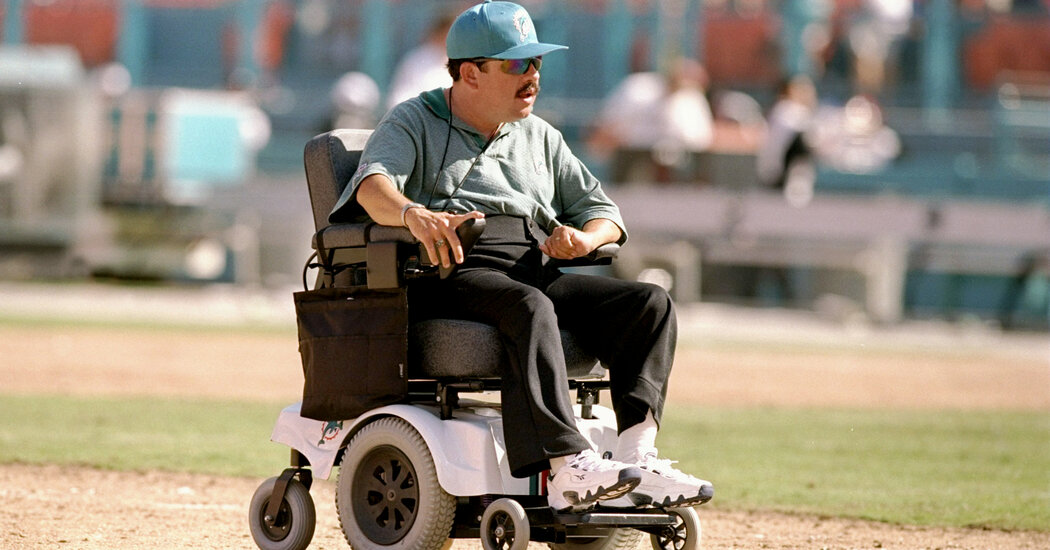Doug Blevins, who successfully coached college and N.F.L. kickers like Adam Vinatieri and Justin Tucker, despite never having played football because he had cerebral palsy, died on Sunday in Johnson City, in east Tennessee. He was 60.
His son, Roman, said the cause of death, in a hospital, was complications of esophageal cancer.
Doug was fascinated with football from a young age, and increasingly with the nuances of kicking. He watched games and instructional videos, read books and, in high school, started to correspond with the Dallas Cowboys’ former kicking coach Ben Agajanian. Doug would analyze video that Agajanian sent him, then use the information to improve the kicking on his high school team, where he was the trainer.
“Since I was handicapped, I knew I’d never play a down,” Blevins told The Los Angeles Times in 2000. “But I was set on this goal, making it to the National Football League.”
Blevins, who instructed kickers from his motorized wheelchair, taught himself the mechanics of place-kicking, punting and kickoffs. He analyzed hip rotations, leg swings and toe angles; he talked to kickers about where to ideally plant a foot before kicking a field goal and how to square one’s body to the end zone.
His best-known students included Vinatieri, who became the N.F.L.’s career scoring leader with the New England Patriots and Indianapolis Colts and who kicked two Super Bowl-winning field goals; Tucker, of the Baltimore Ravens, who holds the league record for the highest percentage of field goals made; and Olindo Mare, the Miami Dolphins’ all-time scoring and field goal leader.
By the mid-1990s, Blevins’s reputation as a kicking guru was beginning to spread. Through an administrator at a community college where he had been coaching, he came to the attention of Dick Steinberg, the general manager of the New York Jets.
Blevins provided Steinberg with scouting reports on the Jets’ kickers in 1993, and the next season he worked as the team’s kicking consultant, a major shift in his career.
“This is an uphill battle,” Blevins told Sports Illustrated for a profile of him in 2004, noting that it was especially difficult because he was not an ex-player and even more challenging because of his disability. “I needed to have walking, talking résumés out there. If I had guys I found who became successful kickers in the N.F.L., then I’d always have a place in this league.”
In 1995, he began a five-year consulting stint with the World League of American Football (later known as N.F.L. Europe), where he taught soccer players to be N.F.L.-style kickers and selected the kickers for the teams.
Between 1995 and 1996, he spent several months in his hometown, Abingdon, Va., fine-tuning the place-kicking skills of Vinatieri, an undrafted kicker from South Dakota State University.
As a result of their collaboration, Vinatieri became a more consistent kicker, blasting footballs off his powerful right foot. Blevins placed him with the Amsterdam Admirals of the World League in 1996, and the Patriots signed him later that year. His career included kicking two Super Bowl-winning field goals for the Patriots.
“Doug has the perfect kick in his mind,” Vinatieri told Sports Illustrated, adding, “He watches you and figures out what you need to do.”
“I wouldn’t be here without him,” he added.
William Douglas Blevins was born in Abingdon on Aug. 3, 1963. His father, Willis, was an engineer. His mother, Linda (LaFon) Blevins, was a nurse who encouraged Doug to pursue whatever he wanted.
In the early 1980s, while attending the University of Tennessee, Blevins was a student assistant coach under Johnny Majors. After transferring to East Tennessee State University, in Johnson City, he held the same position, working for the head coach Mike Ayers. He earned a bachelor’s degree in criminal science in 1988.
He soon began holding instructional camps in southeastern states — which he did for many years — and tutoring kickers. From 1992 to 1995, Blevins was the special teams coordinator and kicking coach at Abingdon High School.
In 1997, while still working for the World League, he was hired by Jimmy Johnson, the head coach of the Miami Dolphins, as the kicking coach. He helped Mare win the No. 1 place-kicking job by slowing down his kick.
Johnson said it was Blevins’s single-minded focus that helped the kickers.
“A lot of kickers get off on their own and get out of rhythm; a lot can happen to them if someone isn’t coaching them on every single kick,” Johnson said in a phone interview. “Doug knew that was his role and charted every one of his kicks, and Mare became one of the best Dolphins kickers ever.”
After six years with the Dolphins, Blevins became a consultant to the Minnesota Vikings in 2004. He helped improve Aaron Elling’s distance and hang-time on kickoffs.
During the team’s training camp that year, Elling told The Minneapolis Star Tribune that Blevins “can see every mechanical thing you’re doing on a kick, all at once.”
The Vikings job was Blevins’s final one for an N.F.L. team. But he continued to work with kickers individually and coached at Emory & Henry College, in Emory, Va., and at East Tennessee State. He had agreed to join the staff of Tusculum University, in Greeneville, Tenn., before he was diagnosed with cancer.
Billy Taylor, Tusculum’s new head coach, was a player at East Tennessee State when Blevins was a student assistant coach.
“Doug wheeled himself into Coach Ayers’s office and said, ‘Coach, I’ve lived with cerebral palsy all my life, but I’m a linebacker at heart,’” Taylor said by phone, recalling the conversation. “‘I love football, and I want to be part of this.’”
In addition to his son, Roman, from his first marriage, to Nenita Colon, which ended in divorce, Blevins is survived by his parents; his daughter, Sarah Blevins, from his marriage to Nancy Duque, which also ended in divorce; his brother, Greg LaFon; his grandmother Kathleen Hensley; and his stepmother, Carmen Blevins.
Blevins said that his disability did not lessen his passion to coach players in a specialty that he knew so well.
“Professional football is a results-oriented business,” he told Abilities.com, a disabilities website. “As soon as people saw that I could create the desired results and achieve the appropriate level of success, I was welcomed into the arena.”

